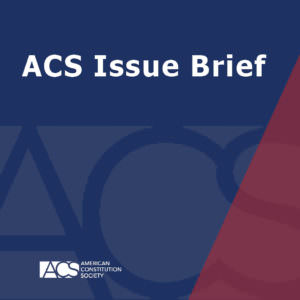After Eight: Separation of Powers Concerns in the Wake of Proposition 8
Deputy Solicitor General, California Department of Justice
Partner, Squire Patton Boggs

ACS is pleased to distribute an Issue Brief by Gonzalo C. Martinez and Troy M. Yoshino entitled "After Eight: Separation of Powers Concerns in the Wake of Proposition 8". This Issue Brief distills arguments that were presented in the amicus brief filed in the Proposition 8 litigation by the San Francisco La Raza Lawyers Association, for which the authors served as counsel. Proposition 8, a ballot initiative that passed in November 2008, added a new section to the California Constitution which provides that "Only marriage between a man and a woman is valid or recognized in California." The initiative's proponents intended for Proposition 8 to reverse the California Supreme Court's In re Marriage Cases decision, which found that the California Constitution's rights of liberty, privacy, equal protection, and due process protected the right of same-sex couples to marry. A lawsuit was filed by a group of petitioners, including same-sex couples who were unable to marry and those who wanted to preserve legal recognition of their marriages, requesting the California Supreme Court to stay and immediately review the validity of Proposition 8. The majority of press attention has focused on the petitioners' arguments that Proposition 8 is invalid as an improper constitutional revision of the state constitution that could not be accomplished through the initiative process, which only permits constitutional amendments.
The authors agree that Proposition 8 should be struck down if the California Supreme Court finds it to have been an unconstitutional revision, but Mr. Martinez and Mr. Yoshino focus on presenting an argument in the alternative:
[T]o the extent the rights to liberty, privacy, due process and equal protection have not themselves been changed, then the pre-existing interpretation of those rights in Marriage Cases must control—and the attempt to mandate a change in the California Supreme Court's interpretation of pre-existing rights violates separation of powers principles. Thus, even if Proposition 8 is construed as a permissible amendment (as opposed to a revision), it would necessarily violate separation of powers principles because it purports to dictate a specific interpretation of certain other—indisputably unchanged—constitutional provisions.
In their Issue Brief, the authors explain their view that Proposition 8's attempt to change the Court's reasoning and interpretation of fundamental rights, "without revising the bases for the Court's reasoning, violates separation of powers principles inherent in the California Constitution and renders Proposition 8 unconstitutional." Mr. Martinez and Mr. Yoshino conclude by advising, "[t]his attempt to control judicial interpretive power should also underscore why those who care about separation of powers and the integrity of the three branches of government should be profoundly troubled by Proposition 8, regardless of their position on same-sex marriage."
Read the full Issue Brief here: After Eight: Separation of Powers Concerns in the Wake of Proposition 8
